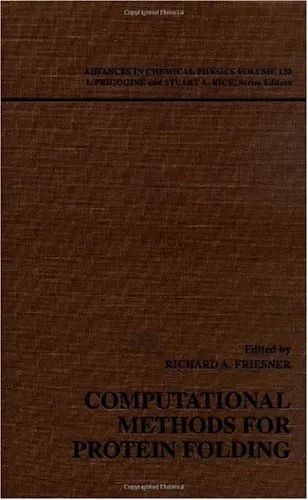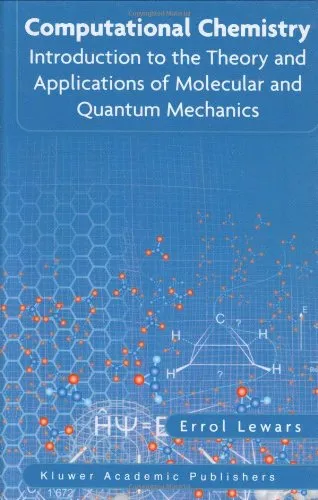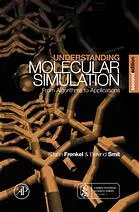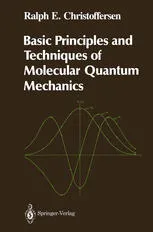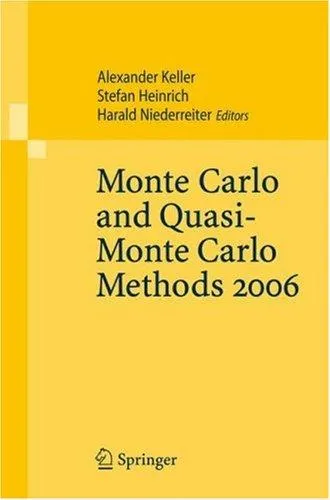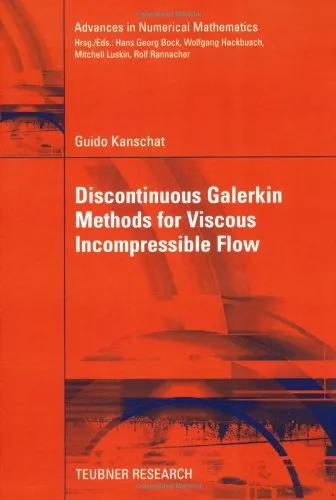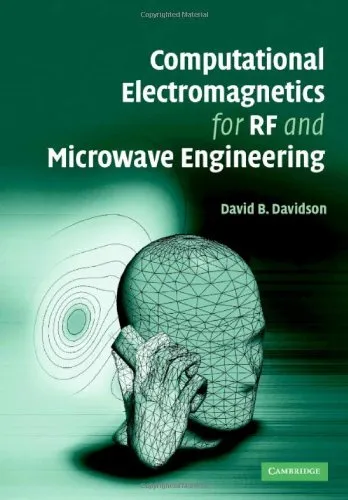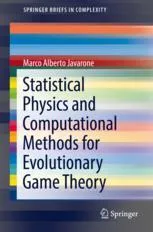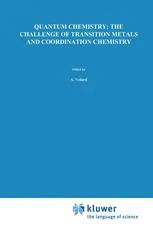Advances in Chemical Physics, Computational Methods for Protein Folding
4.5
بر اساس نظر کاربران

شما میتونید سوالاتتون در باره کتاب رو از هوش مصنوعیش بعد از ورود بپرسید
هر دانلود یا پرسش از هوش مصنوعی 2 امتیاز لازم دارد، برای بدست آوردن امتیاز رایگان، به صفحه ی راهنمای امتیازات سر بزنید و یک سری کار ارزشمند انجام بدینکتاب های مرتبط:
مقدمه کتاب
کتاب Advances in Chemical Physics, Computational Methods for Protein Folding نوشته ریچارد ای. فرایسنر یکی از آثار ارزشمند در زمینه فیزیک شیمیایی و روشهای محاسباتی برای تحلیل و تاشدگی پروتئینها است. این کتاب به خوانندگان نگاهی عمیق به تکنیکها و روشهای نوین محاسباتی ارائه میدهد که به شیمیدانان و محققین زیستی کمک میکند تا پیچیدگیهای تاشدگی پروتئینها را بهتر درک کنند.
خلاصهای جامع از کتاب
کتاب به بررسی دقیق روشهای مختلف Computational برای مطالعه تاشدگی پروتئین میپردازد. این فرایند تاشدگی پروتئین، یکی از مهمترین و پیچیدهترین مسائل زیستی است که درک آن برای داشتن شناختی جامع از عملکرد حیاتی پروتئینها ضروری میباشد. نویسنده با دقت تمامی جنبههای تئوریک و عملی موضوع را کاوش کرده و به ارائه راهحلهای متنوعی میپردازد که میتوانند در تحقیقات بعدی مورد استفاده قرار گیرند.
نکات کلیدی کتاب
- تأکید بر روشهای Computational در تحلیل ساختار پروتئینها.
- بررسی مدلهای فیزیکی و شیمیایی مرتبط با تاشدگی پروتئین.
- معرفی نوآوریها و روشهای جدید در مطالعات Computational.
- پرداختن به چالشهای موجود در شبیهسازی و پیشبینی ساختار پروتئینها.
- ارائه راهکارهایی برای بهبود دقت نتایج محاسباتی.
جملات معروف از کتاب
"درک بهتر از تاشدگی پروتئین، کلید کشف رازهای بیشماری در حوزه زیستشیمی است و با استفاده از روشهای Computational، میتوان به این درک نزدیکتر شد."
چرا این کتاب اهمیت دارد
کتاب Advances in Chemical Physics, Computational Methods for Protein Folding به عنوان منبعی جامع و کاربردی برای محققین و دانشجویان در رشتههای شیمی، زیستشناسی و بیوفیزیک اهمیت دارد. این اثر با تمرکز بر جنبههای عملی و نظری موضوع، به کاربران کمک میکند تا با استفاده از روشهای محاسباتی پیشرفته، به تحلیل و درک بهتری از پیچیدگیهای ساختاری پروتئینها دست یابند. روشهای جدید و تکنیکهای ارائه شده در این کتاب میتوانند به بهبود کیفیت پژوهشها و کاربردهای بالقوه در زمینههای مختلف پزشکی و داروسازی منجر شوند.
Welcome to the world of protein folding, a captivating domain within the broader field of chemical physics. "Advances in Chemical Physics, Computational Methods for Protein Folding" is a pivotal resource that delves deep into the methodologies and advancements driving our understanding of protein folding mechanisms. Authored by Richard A. Friesner, this book serves as an integral guide for researchers, academicians, and anyone keen on exploring the intersections between computational techniques and biological phenomena.
Detailed Summary of the Book
The book is an enlightening journey through the sophisticated landscape of computational methods applied to protein folding. It offers a comprehensive examination of the theoretical underpinnings and practical implementations of computational strategies that have revolutionized our ability to predict protein structure and dynamics. Structured into coherent sections, it begins with an introduction to the fundamental concepts of protein structure and the thermodynamic principles governing folding processes. As readers progress, they encounter detailed expositions on simulation models, including molecular dynamics and Monte Carlo methods, which serve as the backbone for computational analysis. The book discusses the role of computational algorithms and provides insights into the development of new models that enhance predictive accuracy. Through meticulous exploration, Friesner highlights breakthroughs in quantum mechanical methods and their contribution to understanding electronic configurations and energy states within proteins. Of particular interest is the coverage of hybrid methods, which combine various computational techniques to overcome limitations inherent in individual approaches. The book also emphasizes the role of machine learning and artificial intelligence in advancing predictive models, offering a glimpse into the future of computational protein folding.
Key Takeaways
The book synthesizes complex concepts into actionable insights, making it a vital resource for anyone involved in computational biology. Key takeaways include:
- The critical role of thermodynamics and kinetics in understanding protein folding pathways and misfolding mechanisms.
- An appreciation of the diversity and scope of computational tools available for modeling protein folding.
- Insights into the intricate balance between speed and accuracy in computational predictions.
- Understanding of how interdisciplinary approaches, integrating quantum mechanics, classical mechanics, and AI, are shaping the future of the field.
Famous Quotes from the Book
Throughout the book, Friesner articulates profound thoughts that resonate with both novices and seasoned researchers. Here are a few memorable excerpts:
"The dance of proteins within the cellular milieu is a choreography dictated by the laws of physics—a performance unveiled by computational prowess."
"In the convergence of algorithms and atoms lies the promise of deciphering life's most enigmatic structures."
"As we illuminate the pathways of protein folding, we edge closer to mastering the subtle artistry of nature's design."
Why This Book Matters
This book stands at the forefront of a scientific revolution, bridging the gap between theoretical models and practical applications in biotechnology and medicine. It matters because it empowers us to tackle fundamental questions about protein misfolding diseases, such as Alzheimer's and Parkinson’s, potentially guiding the development of new therapeutic strategies. By offering a detailed exploration of computational methods, Friesner equips researchers with the tools needed to innovate across various fields, from drug design to synthetic biology. The book also serves as a reference point for educators who seek to imbue the next generation of scientists with the skills and knowledge vital for advancing our understanding of biological systems. In essence, "Advances in Chemical Physics, Computational Methods for Protein Folding" is more than a technical manual—it is a manifesto for the progressive convergence of disciplines in pursuit of understanding the machinery of life.
دانلود رایگان مستقیم
شما میتونید سوالاتتون در باره کتاب رو از هوش مصنوعیش بعد از ورود بپرسید
دسترسی به کتابها از طریق پلتفرمهای قانونی و کتابخانههای عمومی نه تنها از حقوق نویسندگان و ناشران حمایت میکند، بلکه به پایداری فرهنگ کتابخوانی نیز کمک میرساند. پیش از دانلود، لحظهای به بررسی این گزینهها فکر کنید.
این کتاب رو در پلتفرم های دیگه ببینید
WorldCat به شما کمک میکنه تا کتاب ها رو در کتابخانه های سراسر دنیا پیدا کنید
امتیازها، نظرات تخصصی و صحبت ها درباره کتاب را در Goodreads ببینید
کتابهای کمیاب یا دست دوم را در AbeBooks پیدا کنید و بخرید
1291
بازدید4.5
امتیاز0
نظر98%
رضایتنظرات:
4.5
بر اساس 0 نظر کاربران
Questions & Answers
Ask questions about this book or help others by answering
No questions yet. Be the first to ask!
